Chinese "boxers" against the "white devils"
The initial relationship of Russian and Chinese were the most friendly. The Chinese were first announced that the Russian ships with the troops "came to defend China from the Germans, and as soon as the Germans leave, we will leave." Following instructions from Beijing, the governor-general of Pecile declared to the British consul in Tianjin that "the Russians had come to Port Arthur to protect the interests of China."
The Russian Ambassador, Pavlov, wrote: “The Chinese authorities in Port Arthur and Talienwane are giving our courts the widest attention.” The Chinese ships took turns to Chefu to deliver food to Russian ships. The Chinese authorities warned every desire of Russian sailors. There was a mutual exchange of gifts, dinners and courtesies. The entire coal supply in Port Arthur was handed over to Rear Admiral Reunov completely free of charge; then, by order of the central Chinese government, an additional coal supply for Russian ships was sent from Shanghai. Our ships arrived at Port Arthur with a minimum supply of coal and without money, as the expedition was secret, and when they left Nagasaki, the commanders were informed that they were going to Fuzan. And in Fuzana were coal reserves. When sealed envelopes with orders were opened at sea, it turned out that the detachment was going to Port Arthur. “Fortunately, there was enough coal, but there were also such vessels that were hanging by a thread,” one of the witnesses wrote. Upon arrival in the Port Arthur, the Russians were rescued by the Chinese.
It is clear that the active actions of the Russians caused alarm in Japan and Britain. 18 December 1897 The British squadron Admiral Bueller appeared on Chemulpo raid. At the same time, rumors spread about the plans of the British to land troops on the islands of Chu-san and to the port of Hamilton. The London press has taken a very aggressive stance. Lord Walsney declared that if the war began, it would find the British army in brilliant condition. The Russian ambassador in London told the British government that Russia was extremely surprised by the alarm that had arisen in London, that, in the opinion of the Russian government, the interests of Russia and Great Britain in the Far East could not come into serious clash. Later it became obvious that London is quite satisfied with this answer.
The relatively peaceful position of London was due to the fact that for a short period the Russian and German empires actually acted as an allied tandem, achieving their strategic goals in the large Far East. This forced England to act with extreme caution so as not to push Russia into the arms of Germany. The military-strategic alliance of Russia and Germany was the worst dream of the Anglo-Saxons.
Japan acted in a similar way. First, the appearance of the Russian Empire in the Japanese Empire fleet in Port Arthur led to a number of belligerent preparations. All admiralties were ordered to keep the ships in full combat readiness, to hasten with their repair, to carry out work even at night. Japanese Foreign Minister Nissi asked the Russian envoy what goals Russia pursued while occupying Port Arthur and whether the Russians mean promoting or opposing German enterprises in China. Baron Rosen said that the occupation of Port Arthur is directly related to the occupation of Qingdao, that Germany’s actions are prompting Russia to seek secure parking near the Shandong Peninsula, that “our policy is entirely aimed at maintaining peace and tranquility in the Far East, and that sending a detachment for temporary parking in Port Arthur is obviously just a precaution, not directed against anyone and taken with the consent of the Chinese government. ”
At the same time, the Japanese envoy in Beijing demanded explanations from the Chinese government and reminded them of the promise made when returning the Liaodong Peninsula not to give this area to any other power. The Chinese responded that the territorial assignment of Port Arthur is out of the question, and that, by a friendly agreement with the Russian Empire, its fleet was only given the right to use Port Arthur and Talenenwan for temporary parking.
Like Britain, Japan did not dare to actively protest and take any action. In Tokyo, they saw that the “triple accord”, which forced Japan to abandon part of the fruits of the victory over the Celestial, is still alive. That the actions of Russia and Germany were apparently coordinated: the German and Russian fleets in just one month occupied China’s three best northern harbors. Indeed, Russia and Germany had a honeymoon during this period. 5 December 1897, the German emperor Wilhelm II, talking with the Russian ambassador in Berlin about Qingdao and Port Arthur, said: "Your enemies - whether the British or the Japanese - become my enemies, and no matter how aggressive they are, Whatever your interests are, rest assured that the German squadron will be side by side with your military courts. ”
However, Russia's actions have strengthened the war party in the Japanese Empire. The Japanese Empire concluded that Tokyo needed a strong ally in Europe so that it could fight with Russia without the intervention of other countries. Thus, Japan and Britain began to lean towards an alliance with each other. The British needed “cannon fodder” for a war with the Russians. And the Japanese needed a strong ally in the West to avoid the interference of third countries.
China could not defend Port Arthur, because Beijing needed money to pay the contribution of Japan. The day before the arrival of the Russian squadron in Port Arthur, the Chinese asked Russia for a new loan of one hundred million lanes. Russia also guaranteed this loan, just as it had already secured the 1895 loan. However, China was given a number of conditions: 1) unconditional confirmation of the southern direction of the China Eastern Railway; 2) China will undertake not to allow any foreigners, except Russians, to build railways and operate other industrial enterprises in all three provinces of Manchuria, as well as in Mongolia; 3) Beijing will provide Russia with a choice of a port for arranging a port for the Voluntary Fleet, and the new port will have the right to include all vessels under the Russian flag, etc.
12 March 1898. The armored cruisers “Rurik” and “Dmitry Donskoy” arrived from the Baltic Sea and entered the Yellow Sea. On March 11, the Chinese government in Beijing, in negotiations with Pavlov, agreed to transfer to Russia Port Arthur and Talenwang with the adjacent territories for a period of 25 years. 15 (27) March 1898 of the year in Beijing was signed by the Russian charge d'affaires A. Pavlov and a member of the imperial Secretariat and the Board of Foreign Affairs of the Qin Li Hongzhang Empire government. The highest Chinese dignitaries received large bribes: Li Hongzhang - 500 thousand rubles and Chang Inhuang - 250 thousand rubles.
According to Articles I, II and III of this convention, Russia received Lüshun and Dalian for the full and exclusive rental use of 25 for years with the adjacent water and territorial space while maintaining the sovereign rights of the Qing Empire to this territory. According to articles IV and V of this convention, in the leased territories the military and top civilian leadership was transferred to the Russian authorities. To the north of the leased area, a neutral zone was established with preservation of the Qing administration and admission of Chinese troops to this zone as agreed with the Russian authorities. According to Article VI of the Convention, Lüshun, as a purely military port of Russia and Qing, was declared closed to the courts of all other powers. All Dalian bays, except for one, which was intended only for Russia and Qing, were declared free for access by merchant ships of all countries. The Convention also gave the right to the CERCW Society to build a railway line from one of the CER to stations in Dalian, and, if necessary, to another point between the Yingze River City and the Yalu River. On the territory obtained by Russia, Kwantung Oblast was formed.
7 May 1898 to this convention an additional protocol was signed, according to which the government of the Qing empire undertook not to cede to foreigners without a single section of the neutral zone, not to open any of the ports along the east and west coasts of this zone for trade, not to provide foreigners with rail , mining and industrial concessions in the neutral zone.
At the same time, the problem of creating a Russian base was solved in Port Arthur itself. Local Chinese forces were commanded by Generals Song Qing and Ma Yukun. Dubasov quickly resolved the problem of the landing of Russian troops in Port Arthur and the departure of the Chinese garrison from there. General Sun Qing received 100 thousand rubles, and General Ma Yuikun received 50 thousand rubles in gold and silver. Not cheated and smaller superiors. In addition, the Russians had a power argument - 12-inch guns of the battleships Sisoy the Great and Navarin. As a result, a strong Chinese garrison left the fortress in less than a day, leaving dozens of powerful cannons with ammunition to the Russians.
The first Russian military units descended from the steamboat that arrived from Vladivostok, the Saratov volunteer fleet. These were two hundred Transbaikalian Cossacks, a field artillery division and a team of serf artillery. A Russian garrison appeared in Port Arthur. At 8 in the morning hours of March 16, while the landing was under way, Grand Duke Kirill Vladimirovich raised the flag of St. Andrew’s flag next to the Chinese yellow flag on the mast of Golden Mountain (the summit dominating Port Arthur). The squadron salute rang out - Port Arthur officially became a Russian naval base.
On the same day, March 16, a Russian landing party took place in Talenwen. Rear Admiral Reunov with the Dmitry Donskoy cruiser, the Koreets cannon boat and the Horseman clipper were sent here from Port Arthur the day before. A total of 180 people were landed on Talienwan with three guns. The order was not disturbed either in Port Arthur or in Talenwen. A significant part of the population left both cities. The Chinese well remembered the massacre perpetrated by the Japanese army during the occupation of Port Arthur, and chose not to tempt fate. The Russian command did not object, since it was possible to place the garrisons in buildings abandoned by the Chinese.
The Russian emperor Nicholas II issued the following order on this occasion: “The Emperor declares the highest gratitude to Vice Admiral Dubasov, the Commander of the Pacific Squadron and the Royal Blessing, to all the ranks of the squadron entrusted to him and the ground detachment for excellent performance of assigned assignments for occupying him. and Tallienvan. "
Not far from Port Arthur is a group of islands, which the Chinese called Miao-tao. The islands were of strategic importance, since by placing troops on them, it was possible to block Port Arthur from the sea. Russian sailors understood this and Rear Admiral Dubasov decided to occupy them. 16 November The 1898 cruiser “Dmitry Donskoy” landed a small landing force on the islands, and the islands were distributed to the population of the islands on the accession of the islands to the territory leased by Russia. However, Foreign Minister Count Muravyov was frightened and persuaded Tsar Nicholas II to issue an order to withdraw Russian forces from the islands of Miao-tao. Although taking into account the territories already occupied by Russia, these islands would have been invisible. In exchange, Russian diplomats concluded a separate agreement with the Chinese on these islands, according to which China promised not to transfer them to other countries and not to allow foreign ships to base on them. This was another mistake of our diplomats. So, a few days before the start of the Russian-Japanese war, the Japanese captured these islands, and then began to use them as a naval base of the Japanese fleet for the blockade of Port Arthur.
The assembly of destroyers in the temporary shed on the Tiger tail spit in Port Arthur
Further dismemberment of China
At the occupation of Port Arthur, Britain responded with traditional British blackmail. "The Lady of the Seas" sent a powerful squadron to the Yellow Sea. This squadron was superior in power to the Russian, but our sailors simply ignored the British. England would not dare to dare to go to war against Russia without allies. France was an official ally of Russia, and St. Petersburg had very good relations with Germany at that time. Therefore, Russia did not retreat.
Then the British decided to expand their sphere of influence at the expense of the Middle Kingdom - to take away from China the port of Weihaiwei with its environs. 25 March 1898 Britain demanded that the Chinese government assign Weihai Wei on the north coast of Shandong in order to get its own base on the approaches to Beijing and for the "balance" of forces with the Russian Empire. In addition, the British filed claims to increase their holdings on the Jiulong Peninsula (Kowloon) on the mainland opposite Hong Kong. Jiulong's lease was formalized by the Anglo-Chinese agreement of 9 June, and Weihai-Wei's lease of 25 years was 1 July 1898. At the same time, the British achieved an expansion of the rights of English navigation on Chinese rivers. So, for example, England received actual recognition of the Yangtze River Basin, the richest part of the Middle Kingdom, as a British sphere of influence.
France did not stand aside. 7 March 1898 The French demanded a "coal station" (de facto naval base) in southern China, a concession to the railroad from the Vietnam border to the city of Yunnan and some other advantages. 9-10 April 1898 was the exchange of notes, which recorded the consent of the Chinese government to the French requirements. At the same time, as a "coal station" of France, the port of Guangzhou was ceded in the province of Guangxi on the basis of the lease.
Italy also decided to "bite off" part of China. 17 February 1899 The Italian envoy Martino made a claim to China for the assignment of Sanming Bay to Italy and to recognize the entire Zhe-jian province in the sphere of Italian influence. This influence should have had an effect, firstly, in carrying the railroad from Sanmyn Bay to the Yangtze River, and secondly, in subordinating to the Italian control of all silk trade in Zhe-jian. The claims were quite serious, as this trade was one of the main sources of income for the Chinese treasury.
However, this time Beijing did not yield. Having received the Italian note and the report on it by the Prime Minister, Empress Cixi threw them on the floor. The note was returned to the private letter of the Prime Minister, which stated that the latter has no right and will not be included in the discussion of such a proposal, as it exceeds its competence. Italy presented an ultimatum. China was silent. And Italy had to abandon the claims, because, in fact, the country did not have a strong fleet or expeditionary forces that could effectively fight in the distant Celestial Empire. In addition, Italy had no money for such a war.
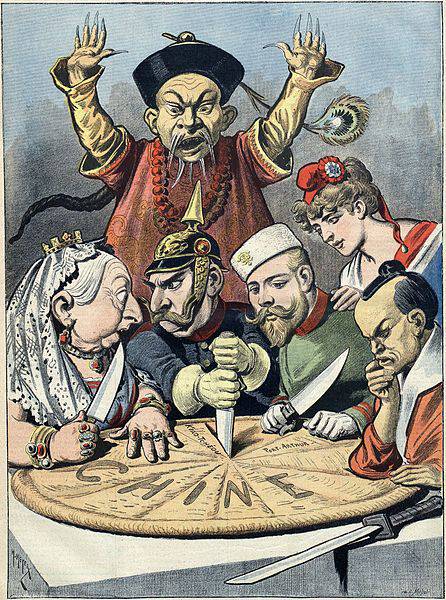
The division of China by the European powers and Japan. Caricature of 1890's
Chinese boxers
Meanwhile phatred of "white devils" grew throughout China, who plundered the country with impunity historical and cultural values, seized its lands, entangled in unequal treaties, turned the Chinese into a sick people - drug addicts, and even brazenly tried to impose their values with the help of Christian missionaries.
Not everything in the world is decided at the festive tables, in the quiet of government offices, when you can simply buy the disgruntled. In China, discontent with the invasion of arrogant and greedy foreigners has long been growing. Ports seized foreigners, they pulled into the country railways, robbing not only Chinese resources, but cultural and historical heritage. Peasants were forced into the interior of the continent, forced to pay taxes to foreigners. Due to the construction of railways, the introduction of postal and telegraph communications, the growth of imports of factory goods, numerous workers of traditional industries, transport and communications lost their jobs: boatmen, carriers, porters, drivers, guards, keepers of messenger services, artisans, etc. Except Moreover, the construction of railroads threatened to leave many thousands of people engaged in hard-boiled fishing without earning money. The tracks of the roads laid destroyed peasant fields, destroyed the old villages and cemeteries. The penetration of foreign goods into China’s domestic market led to the destruction of local industry.
Christian missionaries wanted to spiritually conquer the great Chinese people. Many preachers rushed to China. In China, there were up to a thousand European missionaries and there were several thousand Christian churches. At the same time they considered the Chinese as "savages", "pagans". Moreover, Catholic missionaries defended the newly converted natives from the actions of the Chinese authorities. The priests did not recognize the authorities of the local authorities and the Chinese government in relation to their Christian subjects. And in disputes with the local administration, the missionaries threatened to appeal to the states that had sent them, and the arrival of European soldiers. The activities of Christian missionaries greatly annoyed both local residents and authorities. The Chinese were representatives of the ancient high culture, which arose even before the emergence, for example, of England or France. They remembered it and the actions of the “white devils” in the spiritual sphere caused particular hatred.
The Chinese began to create or develop already existing secret societies, which had ancient roots in the Middle Kingdom. They began to raise people to resist the colonialists. Members of such societies, due to their use of traditional martial arts for China, foreigners began to call "boxers." This movement soon grew into a national liberation war.
The first major hotbed of the uprising was Shandong: railway and telegraph construction, a heightened influx of foreign goods plundered Chinese artisans, handicraftsmen, boatmen. Peasants were forced out of their lands. The situation was aggravated by a natural disaster. Over the years, droughts have recurred here, which, along with cholera epidemics, were interpreted by the local population as consequences of the appearance of “overseas devils”. The situation was aggravated by the atrocities of the German soldiers, who devastated entire provinces, suppressing the centers of the uprising. Shandong was the birthplace of Confucius, and the local population was notable for its particular spirit. Here the work of Christian missionaries faced particular resistance. Therefore, it was Shandong that became, from 1898, the center of activity of the secret Ihequan society - “Fist in the name of justice and harmony”. First, the rebels came up against foreigners and the authorities with the slogan - “Fan Qing, Fu Ming” (“against Qing, let's restore Minov”).
However, the danger from foreigners seemed more serious and one of the leaders of the society, Zhu Hong-deng put forward the slogan “Fan Qing, Mei Yang” (“against Qing, destroy foreigners”), and in 1899, Ihequan accepted the slogan “Fu Qing, Mei Yan” (“We will support Qing, we will destroy foreigners”). In addition, the movement’s tactics were promoted by the authorities, who (in particular, Shandong Governor Yu Xiang), wishing to turn the people’s anger away from themselves (although the policies of the corrupt authorities contributed to the degradation of China and the invasion of foreigners), that they view the units of society as patriotic parts. The rebel detachments of Ihequan were called "Ihetuan" ("Detachments of Justice and Reconciliation"), hence the whole movement came to be called. The name Их э ц ю was included in the name of the society ц ю ((“fist”), therefore this movement was also called “the boxing rebellion”.
The movement was popular in terms of its composition; the Ihetuani detachments included: poor peasants, ruined artisans, transport workers who lost their jobs and demobilized soldiers, as well as women and adolescents. A distinctive feature of all iHethuan was red: members of the organizations wore red belts, red bandages and red banners. There were Yihetuan and yellowbelt detachments. Most of the Ikhetuan organizations had the word "fist" in their name, and on the banners - the image of large fists.
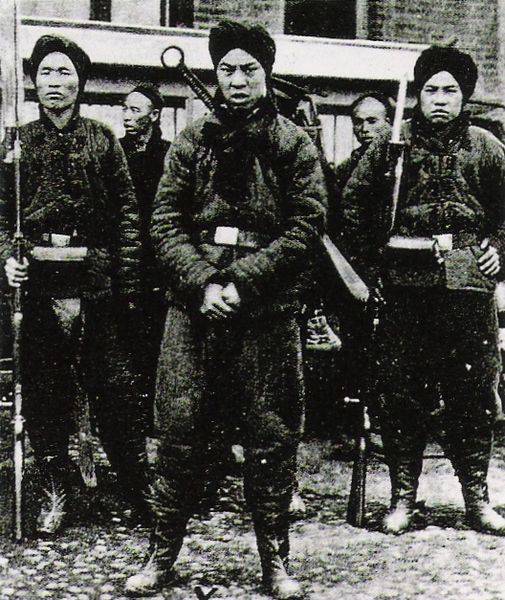
In 1899 and the beginning of 1900, the activities of iXI-Tuan were manifested in a widespread anti-foreign propaganda, the organization of attacks on the premises of religious missions. Then began a direct uprising. Its center of gravity at the beginning of 1900 has moved to the province of Zhili. “Boxers” destroyed railway and telegraph lines, buildings of religious missions, some government agencies and practically controlled the power over a large territory. The movement spread to the provinces of Shanxi and Manchuria. The military actions of the government forces against the ihetians were unsuccessful. Governor Zhili Yu Lu was forced to take the path of negotiations with the ihetuis. Europeans fled from Beijing, and the remaining "boxers" were killed. Many survived in the Embassy Quarter, where they had their own guards. 13-14 on June 1900, the Yihetuan entered Beijing, and 20 on June began the siege of the embassy quarter in Beijing. The siege lasted 56 days.
The Chinese leadership has split. One part wanted to use the patriotic movement to weaken the position of foreigners. Another part of the Chinese elite considered such a course disastrous. In their opinion, it was necessary to find a common language with foreigners and to lift China with their help. So, Li Hongzhang wrote to the empress: “You must immediately appoint a person in charge to cleanse the land of this dirty crowd; you need to ensure the safe passage of foreign ambassadors to the headquarters of the advancing army ... Your Majesty should be guided by the policy of reason and get rid of traitors. "
The government of Empress Cixi, when the attempts of the government troops to suppress the uprising did not lead to success and the movement spread to large segments of the population, decided to support the ihetians. Cixi shared the opinion of the rioters: “Let each of us make every effort to protect our home and the graves of our ancestors from the dirty hands of strangers. We will convey these words to each and everyone in our domain. ” When the rebels entered Beijing and laid siege to the Embassy Quarter, the Qing Empire officially declared war on the Allied States. The Declaration of War was published: “Foreigners behave aggressively towards us, violate our territorial integrity, trample our people and take our property by force ... Besides, they oppress our people or blaspheme our gods. Ordinary people suffer unprecedented oppression, and each of them is very vengeful. Therefore, the brave followers of the Yihetuan burn churches and kill Christians. ” The thing was that the Chinese dignitaries at that time were more afraid of the ihetians than foreigners, so the empress Cixi supported them at the official level.
In reality, the Chinese authorities did nothing to defend the country in the context of foreign intervention and popular uprising. Governors of the central and southern provinces severely cracked down on folk performances in central and southern China. Therefore, the movement of "boxers" was doomed. In addition, as usual, unrest caused an unprecedented surge of crime, looting and violence. Gangs, often hiding behind the name of the Ikhetoani, used the moment to plunder and rape.
England, Germany, Austria-Hungary, France, Japan, USA, Russia and Italy (Alliance of Eight Powers) organized an intervention in China. 17 June their troops occupied the forts Dagu. The Japanese were eager to fight, in the current situation they wanted to take decisive positions in Celestial Empire under the guise of helping "civilized countries" and for this they planned to land an entire army on the continent. However, under the pressure of Germany, Japan had to limit its military contingent in common forces. In the middle of July, the interventionists, overcoming the resistance of the Iheituan, seized Tianjin and soon began a campaign against Beijing. The number of the punitive army reached 40 thousand people. Government troops showed little resistance to the invaders. In mid-August, the interventionists occupied Beijing and, with the arrival of the commander-in-chief of the interventionists of German field marshal Alfred von Waldersee, launched numerous punitive expeditions against individual hotbeds of the movement and the civilian population.
In the atrocities against the Chinese, the Germans were especially “distinguished”. Kaiser Wilhelm II delivered a farewell speech before the expedition waxes sent to China: “You, my people, must know that you will meet a capable, well-armed and cruel enemy. Crush him. No hesitation. Do not take prisoners. If the enemy falls into your hands, kill him. And let another thousand years - as was the case with the Huns of King Attila - your name will terrify the enemy, let the name of Germany sound in Chinese history for another thousand years. "
And in Beijing itself, the interventionists “became famous” by wild robbery. Particularly distinguished Japanese, who seized the Chinese treasury with silver, government silk, as well as stocks of rice. Germans, British and French tried to keep up with them. In search of silver, "civilized" soldiers beat priceless historical vases and objects. The wild mayhem lasted several weeks.
The Qing rulers fled from Beijing to Xian. In the 1901 year, the uprising as a whole was suppressed, although in some areas the struggle continued even in the 1902 year. After the suppression of the uprising, the great powers imposed a lethal “Final Protocol” on China. China apologized to Germany and Japan (for killing diplomatic workers); had to execute all the leaders of the uprising; restore old and put new monuments in all Christian cemeteries of the empire; to prohibit all public organizations of religious persuasion and directed against foreigners. China had to pay a contribution in 450 million lan silver (1 lan weighed 37,3 g and at the exchange rate was approximately 2 silver rubles). Russia received 30% reparations, Germany - 20%, France - 15,75%, Britain - 11,25%, Japan - 7%, USA - 7%, the remaining amount was divided among the other member states of the coalition. Payments should have been made before 1939, while they increased by 4% each year (by the beginning of World War II, they were 982 million lang). China had to tear down the fortifications of Dagou; foreigners could build 12 reference points on their way from Beijing to the sea.
Russia's actions
The party of the war in Russia was headed by the Minister of Internal Affairs Plehve, who longed for victory on the far frontiers. The spirit of the nation will receive a new direction. Russia, in his opinion, will emerge from the turmoil of internal confrontation and gain a new future. He was supported by high-ranking relatives of the tsar, especially his three uncles, father’s brothers: Grand Duke Vladimir (commander of the guard), Grand Duke Alexei (commander-in-chief of the fleet) and Grand Duke Sergei (governor-general of Moscow). The Minister of War Alexei Kuropatkin also held a tough position. He ordered Lieutenant General Nikolai Linevich to lead the Russian troops to Beijing. Kuropatkin apparently came to the conclusion that China’s “irreparable” weakness and the great strength of Japan had come to an end. War with Japan is inevitable. Therefore, Russia must take a strong position in Manchuria and Korea, and protect the sphere of Russian influence with all its forces. In the first few months of the uprising, Russian forces in the Pacific and in the Kwantung Region were commanded by Vice Admiral Yevgeny Alekseev.
On the other hand, in Russia there was a more peaceful party. Russia's task in Asia was to prevent the Japanese from gaining a foothold on the continent. At the same time, Russia had a secret agreement with China, the two powers were actually allies. Therefore, in the Russian Foreign Ministry they were afraid that Russia, participating in the intervention, in the eyes of the Middle Kingdom, would become a cruel and insidious neighbor who wants to use China's weakness. Foreign Minister Mikhail Muravyov (died 1900 in June), and his shiftman Vladimir Lamsdorf insisted that Russian participation in the allied punitive expedition against the “boxers” was minimal, so that Russian troops would not be “ferocious”, so that the Chinese would not Russian "historical enemy." Like, let the Russian troops confine themselves to the protection of Russian diplomats and their property, "do not oppose themselves to the Chinese revolution." Under pressure from Witte and Lamsdorf, Russian troops left Beijing at the very moment when the Germans set off with punitive missions in the provinces. Russian forces left for Manchuria.
However, the Chinese themselves gave a reason for the revitalization of the Russian forces. The Chinese (partly regular troops, partly - the militia and gangs) attacked the Trans-Siberian main road near Harbin, blocked access roads to Port Arthur. Kwantung Oblast (Port Arthur district) was transferred to martial law. Work began on strengthening the Jinzhou position that defended Kwantung from the land side. A large amount of work was done during the month, which allowed to remove the threat of invasion from the mainland. By mid-July, the troops of the Kwantung Region fought hard with the regular Chinese army. By the end of July, the Russians defeated the Chinese units between Port Arthur and Yingkou and restored movement on this section of the CER.
The Chinese troops tried to besiege Harbin, but were repulsed. Also, the protection of the CER and the sailors (gunners "Brave" and "Thundering") repelled the attack of the Chinese troops on Yingkou. However, the Chinese destroyed sections of the railway: both constructed and unfinished, destroyed telegraph lines and coal mines, residential and office space at railway stations, set fire to bridges. As a result, many builders and station workers were forced to leave their places of work and flee, some died. Chinese troops defeated the Russian detachment in Jilin. In a few days, the Chinese managed to seize most of the South Manchurian Railway. In total, damage from damage on the CER caused by the ichietuis during the July raids amounted to more than 72 million rubles: from 1300 versts of a railway line, 900 was destroyed. The western section of the CER was particularly affected.
Shelling of Blagoveshchensk began with Chinese artillery. Thus, Kuropatkin received a reason for a large-scale response. June 22 in the Amur Military District of the Russian Empire was declared mobilization 12 thousand soldiers. The Ussurian Cossack army under the command of Governor-General Nikolai Chichagov joined the troops. Thousands of Chinese were deported from Blagoveshchensk. Russian troops crossed the border, suppressed enemy firing points and took Hunchun fortress. In Blagoveshchensk and Vladivostok, on the initiative of local authorities, the formation of volunteer groups began to protect the border from gangs.
In early August, a large-scale Russian offensive began. During the offensive, Harbin was unblocked and the railway lines again came under Russian control. Russian troops occupied the right bank of the Amur River and completely cleared it, not only from insurgents and bandits, but also from the entire Chinese population. By the end of August, 1900 almost all of northern Manchuria was occupied by Russian troops. Under the control of the Chinese troops remained only the eastern provinces. 4 September The Russian Empire began a full-scale occupation of the region. September 30 Russians occupied Mukden. By October 1900, the Amur passed new Russian troops, called "temporary troops to protect the railway." In October-November, the troops of the Russian Empire fully occupied Manchuria. An agreement on the restoration of civilian rule and the withdrawal of all Chinese troops from Manchuria was signed with the Qing governor in this region. The restoration of the destroyed CEL began. In December, the Russian army 1901 managed to completely eliminate the remnants of the ihetian groups in Manchuria.
Witte and Lamsdorf tried to soften this hard line. Lamsdorf demanded the withdrawal of Russian troops to the border in order to satisfy China. However, Tsar Nicholas supported Kuropatkin’s power policy, saying that "Asians deserve the lesson they learned." Witte and Lamsdorf were still able to negotiate with Kuropatkin. In 1902, Russia and China signed another treaty, under which Russian troops were to leave Manchuria. The Chinese retained external sovereignty over Manchuria, although they gave Russia all the real rights to own the province. The Russian Empire retained Port Arthur with the adjacent Liaodong Peninsula and the right to use the CER passing through Manchurian territory.
It should be noted that during the uprising of the "boxers" Petersburg missed a chance to improve relations with Tokyo. In the fall of 1900, Japan offered Russia to join Manchuria, while Korea would become a colony of Japan. The proposal was quite reasonable and relieved the tension between the two empires. Russia could concentrate on the development of Manchuria-Zheltorossiya, the question of the coming war with Japan was removed. However, Petersburg refused.
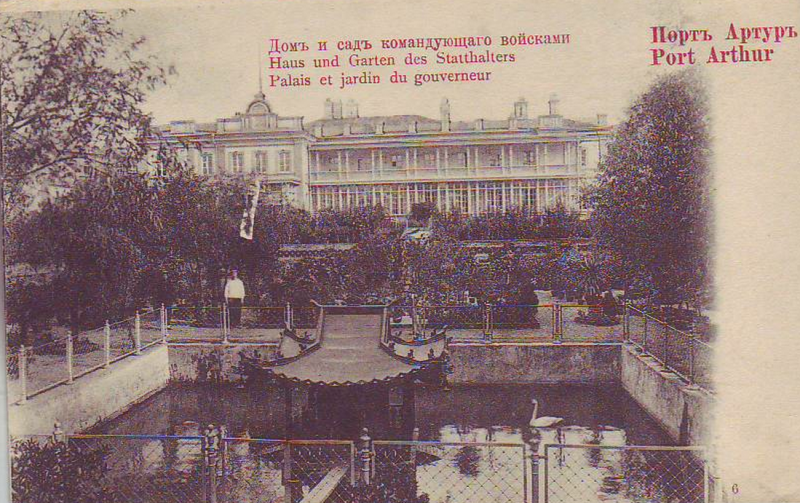
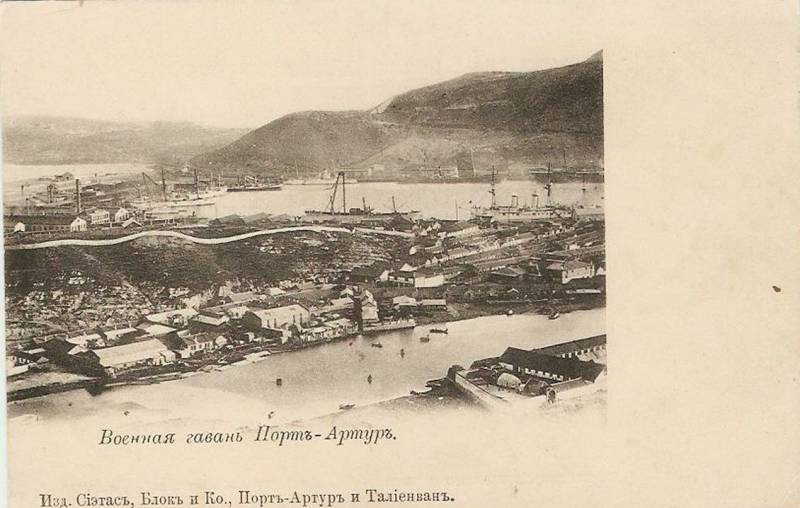
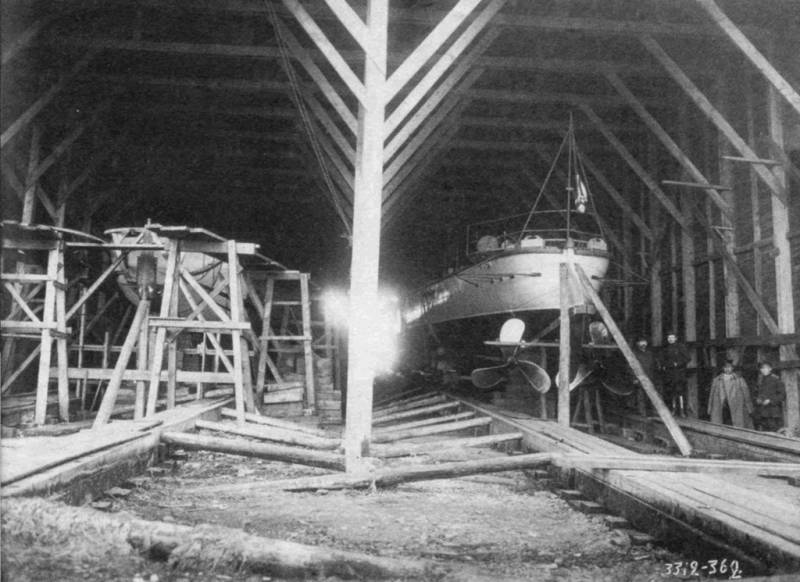
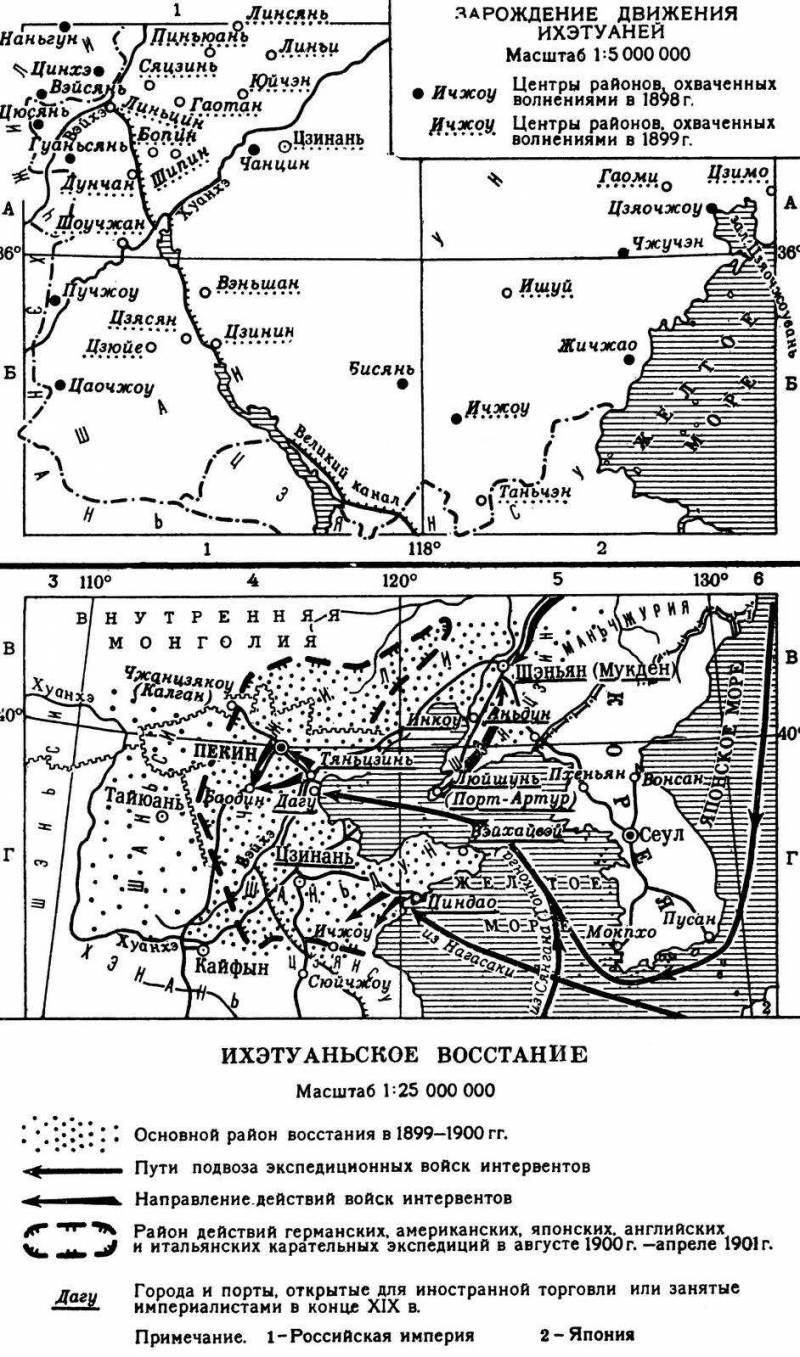
Information